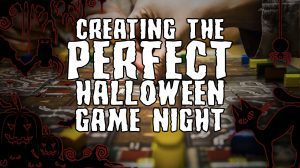Some time ago I wrote a piece titled the Top 6 Types of Gamers. Since then I’ve often thought about that concept, not necessarily as it relates to fitting people into conceptual boxes, but rather about our gaming motivations: Why do we game? What are we hoping to gain from the experience? Are we all seeking the same thing? Should we be? What implications do these questions present us? In a hobby that relies on interaction, these are the questions that keep coming back to me.
So why do we game? The short answer: because it’s fun. But what constitutes fun? To paraphrase one of my favorite podcasters on The Secret Cabal, “to have an effective discussion, we must agree upon our terms”. Something that is fun generates some level of happiness within us; physiologically it activates the pleasure centers within our brains. Therein lies the difficulty in defining fun. We can universally describe how fun feels and we can discuss its effects, but determining its cause is a different story. Each of us may have a different idea of what activities generate the enjoyment that we call fun.
This leads me to the intersection of enjoyment and motivation. If a thing that we are expecting to produce enjoyment succeeds in doing so, we register that as an enjoyable activity, i.e. fun. If it fails to deliver on that promise of satisfaction, we don’t find it as fun.
What fuels our expectations of enjoyment?
Let’s talk about three main motivators that I have seen from myself and others.
Social Experience
 With the notable exception of specifically designed solo games or solo variants, a board game requires at least a modicum of interaction with others, even if it just means being around others while simultaneously doing our own thing. For me the social experience is my top priority. I expect the games I play to facilitate interaction, be it a thematic game that allows us all to dive into a collective experience, one that requires or facilitates discussion and negotiation, or one that forces interaction through some sort of conflict generation.
With the notable exception of specifically designed solo games or solo variants, a board game requires at least a modicum of interaction with others, even if it just means being around others while simultaneously doing our own thing. For me the social experience is my top priority. I expect the games I play to facilitate interaction, be it a thematic game that allows us all to dive into a collective experience, one that requires or facilitates discussion and negotiation, or one that forces interaction through some sort of conflict generation.
Cognitive Reward
One characteristic of modern games that stands out to me is that of meaningful decision-making. That’s not to say that classic games don’t have some level of choice, or that every game necessarily needs to have a complex decision tree to provide enjoyment. I’ve found that nearly all of the games I enjoy involve meaningful choices, more often than not difficult ones. There is an undeniable level of satisfaction that occurs when we are presented with a difficult decision, make a choice, then see a successful outcome as a result of our selection. We feel that our choices are validated and that in and of itself is rewarding.
The Thrill of Victory

Board games generally involve some element of competition. Whether you are competing against your fellow gamers, cooperating with them against the game, or even just competing against yourself and your ability to navigate the systems of the game to achieve the most positive outcome, it feels good to win. Winning is certainly not necessary to enjoy a game; there are plenty of games that I never win that I still love. Some people however find their play experience soured if they lose the game, or see no viable path to victory, be it due to their own erroneous choices or the random chance of a die roll or card draw.
Obligatory Caveat
I don’t mean to reduce a person’s gaming motivation down to a single agenda. I doubt that many people fall solely into one category, rather some mix of the three. If I had to parse it out, I’d say that I’m around 60% social, 30% cognitive, and 10% competitive. My wife, contrastingly, is probably closer to 50% competitive. It doesn’t mean that either one of us is any less a gamer, or any less enjoyable as a gaming partner.
So what does this thought exercise mean for the hobby? What are the practical applications?

Understanding Ourselves
The beauty of the modern hobby is that there are many different types of board games available to us. Different styles, mechanics, themes, ideas, etc. We are presented with a glut of choice that we have never seen before. When I first entered the hobby I played games with abandon; I was excited to try and buy anything, often to the detriment of my bank account. As I’ve grown in the hobby I’ve become more selective in my purchases and plays because I’ve identified the things I like, and those elements that I don’t. Discovering my own motivations for gaming has led me to refine my experiences into ones that provide the optimum level of enjoyment that I’m seeking.
Understanding Others
It can be surprising and even disappointing when you discover that the things you enjoy may not be enjoyable to others. Often times we even attach a part of ourselves to our loves, to the extent that when others reject them we feel they are rejecting us too. Some amount of this is inevitable; our sense of self is shaped by our experiences. But there is a point at which this becomes a detriment. If we understand that others are seeking different things, that they may not look for the same pleasures that we do from a game, we can not only accept, but appreciate the differences between us. My favorite thing about board gaming is that it can provide a level of enjoyment to all those involved, whether that joy comes from the collective excitement of a game-deciding die roll, the satisfaction of seeing your thought-out plan come to fruition, or simply the thrill of besting an opponent.
So the next time you tell someone “You don’t like “x” game, what’s wrong with you?” or are tempted to scoff at a game that you may feel is “not a good game”, try to remember that we are all here to find enjoyment, be it in one way or another. Allowing yourself and others to do so? Well that’s just fun.











Enjoyed your Article …Sadly my wife is like 10% social , 80% cognitive ….10% competitive so she is not much of a gamer….:( I am more like 40%/30%/30%….
This is a great topic and I think your broad strokes have things pretty well covered. However(isn’t there always an however?), there often seems to be a split in the Cognitive Reward, depending on people’s preferences. I’m tempted to break it into Cognitive-interactive and Cognitive-mechanism.
It’s probably easiest to explain with some examples. Cognitive-interactive games involve a large degree of working against or trying to gain some benefit off other players; Hansa Teutonica is a good example. Cognitive-mechanism games are those where your primary focus is making the game’s mechanisms work for you and interacting with other players is often secondary – COB is an example here, or Lacerda games(gross generalisation, I know). Obviously, there are games with a foot in both camps, Brass Birmingham is one that seems to cut both ways.
I probably haven’t explained this well, but it’s something I’ve noticed in the local game group. Some people have a strong preference for player-vs-player and others prefer player-vs-mechanisms-vs-player, yet both styles of play offer up cognitive rewards for a move well played.
Cheers
Nice article. But, I thought we gamed to quiet the little voices in our heads.